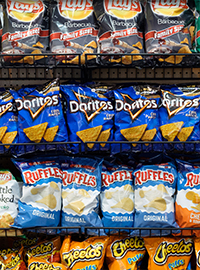| Biden’s “Shrinkflation” Label Aptly Summarizes His Presidency |
 |
|
By Timothy H. Lee
Thursday, February 15 2024 |
Apparently, last year’s “Bidenomics” debacle didn’t sufficiently discourage Joe Biden from attempting to coin new terms in his increasingly desperate reelection effort. Biden is nothing if not stubborn. Curiously declining the invitation to a Super Bowl interview before what turned out to be the largest television audience in American history, Biden instead released a meticulously over-produced promotional video lambasting American businesses for what he labeled “shrinkflation.” Keep in mind that this is the same Biden who initially denied early in his term that inflation was even a legitimate concern. Then when continued denial of the pain that inflation was increasingly inflicting upon beleaguered American consumers became impossible, Biden and his administration shifted to labeling it “transitory” even as it approached double digits at 9.1%. Then when inflation proved anything but transitory, Biden attempted to scapegoat it as “Putin’s Price Hike,” never mind that prices began ascending in February 2021 as he entered office and commenced a flurry of new regulations and pushed his legislative agenda of excessive spending, over a year before Putin invaded Ukraine. Then, when inflation finally began a painfully slow deceleration, Biden prematurely declared victory and spiked the proverbial ball, about the same time that he unveiled “Bidenomics” as some sort of positive descriptor. Nearly a year later, Americans’ collective assessment of Biden’s economic performance sits even lower than his overall approval rating, which itself sits lower at this point in his presidency than any other president in the history of public opinion polling. Accordingly, Biden pivoted toward a new term that he unveiled last weekend: “shrinkflation.” An obvious amalgam blending the terms “shrink” and “inflation,” Biden’s new pet term refers to the alleged business practice by which the size or quantity of products are reduced while maintaining their existing prices, often without alerting potential consumers of the change. In other words, it’s a form of duping consumers into paying the same amount or even more for a downsized product in order to cope with rising production costs or other economic pressures without directly increasing prices. It obviously creates a source of frustration for consumers who feel that they’re getting less value for their money without honest admission from producers. With that in mind, “shrinkflation” offers a fitting metaphor for the Biden Administration itself. Just as “Bidenomics” boomeranged to become a term of derision rather than accolade, a bug rather than a feature in Biden’s foundering reelection effort, “shrinkflation” appears to be another Biden pet term that he may regret unveiling. To wit, mere days after releasing that video, the Labor Department announced that consumer inflation for the month of January exceeded expectations. The Consumer Price Index rose an unexpectedly high 0.3%, and what’s known as the Core Index – which excludes volatile food and energy costs – increased 0.4% and at a 3.9% annual rate. Compounding the bad news, and continuing the “shrinkflation” theme, average U.S. workweeks declined, which meant that real weekly earnings fell 0.3%. Biden’s new “shrinkflation” effort raises another interesting question. If blame lies with American corporations, rather than Biden performance failures throughout his tenure, then why wasn’t it occurring under Biden’s predecessor Donald Trump? After all, Biden labels Trump the maestro of “trickle-down economics,” whereby powerful corporations profit at the expense of vulnerable consumers. Why are we witnessing this now, rather than during four years of the Trump presidency? More broadly, “shrinkflation” accurately captures the sense of continually diminished expectations under Biden, and appropriately serves as shorthand for his presidency. Starting with inflation itself, we’ve reached a point when consumer price index numbers slightly slowing from excruciating to merely painful constitutes success according to Biden and his apologists. By ratcheting inflation up to nearly double digits, Biden almost positioned himself to spin elevated 3% inflation rates as positive. Shrinkflation indeed. Just as “Bidenomics” backfired and only served to remind voters of Biden’s performance failures and the economic angst they continue to suffer, “shrinkflation” already symbolizes the way in which Americans are getting less value for what they invested in electing Biden. |
Related Articles : |
























